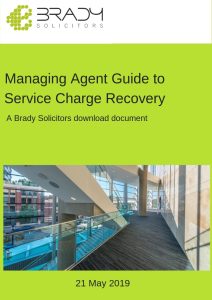Brady Solicitors’ service charge specialists encourage managing agents and landlords to maintain momentum when undertaking Section 20 major works consultations.
You will know that if you want to carry out a set of qualifying works to your block that will cost any one individual leaseholder more than £250, you will need to either go through the statutory Section 20 consultation process or obtain dispensation from the FTT.
Section 20 is designed to protect leaseholders and allow them an involvement in the works carried out at their premises and how their money is spent. It also gives managing agents and freeholders reassurance that they can recover the cost of the works through the service charge.
Time is of the essence though and we have had a number of cases at Brady Solicitors where a delay in the consultation process has led to managing agents facing subsequent opposition from leaseholders.
Whilst there is no legislation that sets out the time limit for section 20 consultations, case law suggests that delays in the consultation process CAN be viewed as a breach, leading to problems with securing the leaseholder contributions.
In Jastrzembski v Westminster City Council [2013] there had been a delay of two years from consultation to work commencing and a change in the nature of the works before they were carried out. The Tribunal accepted that whilst there is no specified time limit for the service of a section 20 notice, the relevant time periods for the work to be undertaken is months rather than years.
The Tribunal found that this delay amounted to a breach of the consultation requirements and the Council was unable to recover more than the statutory £250 per leaseholder.
Things can change
If there is a delay between the consultation process and the commencement of the major works, there is a risk that changes may have taken place that could amount to a breach of the consultation requirements, as in the above case. For example:
- The leaseholders might have changed
- The quotes might have gone up
- The raw materials might be more expensive
- The original tradespeople may be no longer available
- The nature of the works might have evolved and be different
All of which would mean that the original consultation process is invalid and you could be limited to securing no more than £250 per leaseholder.
Establish and maintain a reserve fund
In an ideal situation, your lease will contain provision for a reserve fund and you will have communicated to your leaseholders a rolling five to ten year programme of works. This allows you to make demands in advance of major works projects to build up a (reasonable) reserve fund and to ensure that the block is well maintained and leaseholders are happy. If you don’t have a reserve fund clause in your lease, the first step is to apply to the First-tier Tribunal (Property Chamber) to vary the lease. The FTT generally welcomes such applications, and views reserve funds as prudent management.
Keep the Section 20 ball rolling
The most important and practical piece of advice however is to keep the consultation process rolling – don’t allow it to drag out.
Whether caused by problems getting the funds together, waiting for authority from the directors or simply a lack of time to dedicate to the process, delays can lead to a breach in the consultation requirements and subsequent problems with securing leaseholder contributions.


